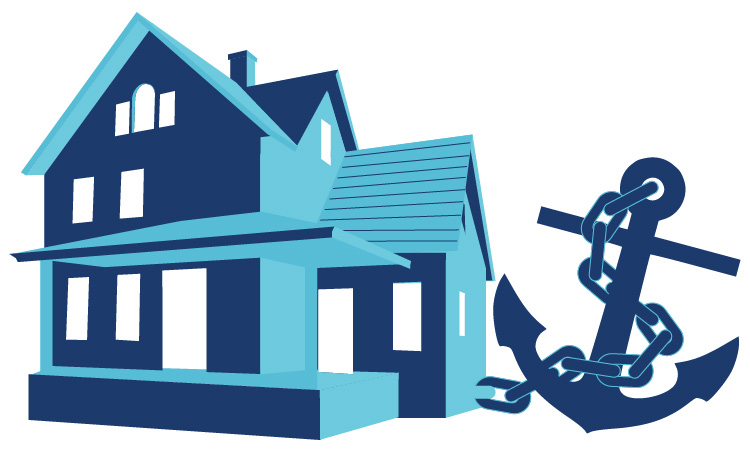Finding the Best Mortgages for Yacht Crew: Tips and Tricks
You don’t have to be in yachting long before you get the inevitable advice, “Invest in property. You can’t go wrong with bricks and mortar.”
At first glance, it’s an attractive suggestion. You’ll need somewhere to live once you leave yachting and, in the meantime, you can rent your property out and make an absolute mint. It’s win-win all the way. At least, that’s what you’ve heard on the crew grapevine.
Not so fast.
While property can (emphasis on ‘can’) be a solid investment, it’s something you need to approach with caution. Owning bricks and mortar is all well and good, but it’s not an investment that is liquid. In other words, you can’t just cash in from one day to the next. Selling property isn’t always straightforward or quick.
Nor can you bring your investment property with you wherever you wander in the world. You are bound to it, not the other way round.
So buying a property while you’re still in yachting to move to when you leave yachting isn’t always the best idea. You might decide you want to live somewhere else altogether when you leave the business. Suddenly, your pre-planned home is in the wrong place and not easily converted into cash so you can buy a new place somewhere else.
As for renting your property out so that it pays for itself… You’ll be at sea. Who’s going to manage your tenants’ demands while you’re managing the guests’ demands on board the yacht? Possibly several thousand miles away? You could hire a management agency. But who’s going to manage them?
Rule number one of buying a property:
Be crystal clear what you want it for. (What problem does it solve and is it the most suitable solution?)
Rule number two:
Know exactly how you are going to manage the property while you are at sea.
Rule number three:
Is now the ideal time for you to be buying a property? (If you don’t have dependents and plan to be in yachting for five years or more, do you really need to bind yourself to a property right now?)

Paying for your property
So you’ve weighed it all up and, yes, absolutely, you want to buy a property. But it’s very likely you don’t have the whole purchase sum lying in your bank account already. You’re going to need a loan, possibly a big one. The most obvious type of loan associated with a property purchase is a mortgage.
Put bluntly, a mortgage is a loan at a variable or fixed interest rate, usually spread over a long period (20 or 30 years), for which the property itself provides the lender with the security that you won’t break your promise to pay them back.
Put even more bluntly: your name might be on the deeds to the property, but the mortgage lender’s financial interests always come first and they will not be slow in enforcing them if you don’t keep up your mortgage payments. So yes, you own the property, but you have to play by the mortgage lenders’ rules.
We’re not saying this to put you off getting a mortgage to buy your property. Instead, we want to help you understand that a mortgage is a pretty hefty and long-term financial commitment. Make sure you understand how they work and what exactly you are signing up for.
The BIG mortgage gotcha
Once you’ve decided you want to buy a property, then get to work on securing a mortgage as soon as possible. Even before you start looking for the property itself.
There are two main reasons for this.
- It can take a while to jump through all the administrative hoops and pull together the information and supporting documents you’ll need—especially if you spend most of your year at sea in a demanding superyacht job.
But that’s nothing compared with the second reason.
- You won’t be able to get a mortgage loan that will cover 100% of the purchase price. You will have to come to the table with a share of the property price—typically called a ‘deposit’.
The size of the deposit varies, but it’s not going to be less than 25%. In most cases, because you are yacht crew and onshore banks can’t wrap their heads around how your life works, you’ll have to stump up a higher deposit. 40% isn’t uncommon. (See the table below.)
| Country (Where the property is) | Normal maximum mortgage amount (% of value of the property) | Maximum mortgage amount for yacht crew (% of value of the property) | Deposit required by yacht crew (% of value of the property) |
| Australia | – | 60-70% | 30-40% |
| Cyprus | – | 50-60% | 40-50% |
| France | 70-80% | 60-70% | 30-40% |
| Greece | – | 65% | 35% |
| Ireland | 60-65% | 50% | 50% |
| Italy | 60% | 50-60% | 40-50% |
| Portugal | 70-80% | 60-70% | 30-40% |
| South Africa | – | up to 50% | 50%+ |
| Spain | 70% | 60-70% | 30-40% |
| United Kingdom | 75% | 75% | 25% |
| United States – excluding Florida | 60% | 50% | 50% |
| United States – Florida | 65-70% | 55-60% | 40-45% |
In addition, you’ll be faced with minimum property and minimum loan requirements too. Again, these vary per country.
| Country (Where the property is) | Minimum purchase price | Minimum mortgage loan |
| Australia | £200,000 | £100,000 |
| Cyprus | £200,000 | £100,000 |
| France | €400,000 | €280,000 |
| Greece | €300,000 | €150,000 |
| Italy | €200,000 | €100,000 |
| Portugal | €200,000 | €100,000 |
| South Africa | £200,000 | £100,000 |
| Spain | €200,000 | €100,000 |
| United States | £200,000 | £130,000 |
Looking at these two tables, it doesn’t take a genius to work out that the best time to think about your mortgage deposit was about five years ago.
If you’re looking at buying a €400,000 property, you’re going to need a deposit that’s anywhere between €100,000 and €200,000. BEFORE you even start applying for a mortgage.
So, if you’re thinking of going the mortgage route, just know that you’re going to have to do a lot of the financial heavy lifting yourself. And get saving now. (By the way, savings plans are better than savings accounts. Find out why here: Best Practices and Recommendations for Saving for Superyacht Crew.
This is a friendly intervention
Let’s just pause and reflect here for a moment, because you might suddenly be wondering whether a mortgage is the right route for you after all.
If you’re already obliged to find up to half the money you’ll need to even get a mortgage, maybe it’s worth looking at what you need to do to save the full 100%? Buy the property outright, without the help of a bank?
Also, let’s add this into the mix. Say you take out a mortgage for €200,000 at an interest rate of 4.4% over 25 years. Your monthly repayments will be a shade over €1,100.
Brace yourself.
Over the term of the loan, you’ll pay back the lender €330,000.
That’s right. You borrowed €200,000 and you’ll pay €130,000 more than that by the time you’ve settled your loan.
Pay the mortgage off over 35 years and you’ll end up paying almost double what you borrowed: just over €392,000.
So you can see there is quite an advantage to being able to buy a property with cash you’ve already accumulated.
We’ve said it often: if you plan properly and are disciplined, you can build up €1 million in wealth over the course of a 15- or 20-year career in yachting. In fact, it can be far more than that.
In other words, you can leave yachting with the money you need to buy your property without the need for a loan. If you’re interested, click this button and let’s have an informal chat:
Meanwhile, let’s get back to mortgages.
Preparing to get a mortgage as superyacht crew

Mortgage lenders are cautious people. They will want to know a lot about you and about the property you intend to buy. So be prepared. Importantly, they will want to know that you have been in yachting for a while and aren’t stuck on the lowest rung of the industry. The longer you’ve been in the business and the higher up you are, the more appealing you’ll be as a client to a lender.
Here is an overview of the kind of information (and possible supporting documentation) you’ll need to provide, even very early on in your application:
- Extensive contact details
- Date of birth
- Marital status
- Number of dependents
- Your nationality
- Current address (and possibly previous addresses too)
- Details of property you already own, including the value
- Details of assets you own (shares, savings, bonds, pensions, etc)
- Your most recent employment history (including details about your current employer)
- Your pre-tax salary income
- Your annual salary income after tax
- Existing loans and mortgages
- Other debts you may have (for instance, credit card debt)
- Monthly fees (school fees, for example)
- Other sources of income
- Whether or not people owe you money
That’s one side of the financial preparation. You could call this the physical side.
The other side is the mental side. In all likelihood, your mortgage will last longer than your career in yachting. That means you need to be ready for the long haul on this one.
Keep in mind that, unless you leave yachting financially independent, you will need to find a job ashore—and those jobs don’t pay as handsomely as superyacht jobs do.
Also, your daily living expenses ashore will be significantly higher. That means other things are going to eat up more of your income. Will you be able to carry the same level of monthly mortgage repayment once you leave the superyacht industry? And will you be able to do so for many years, possibly decades?
Where can superyacht crew get a mortgage?
Typically, you have to get a mortgage in the country where you intend to buy.
By the way, have you checked that you are allowed to buy property there? And, more importantly, that you are allowed to live there? For instance, South African superyacht crew can buy property in many European countries. But living there for the long term…? Well, that’s a whole different matter.
Finding a mortgage lender who will deal with superyacht crew, who will very likely not be a resident nor a citizen of the country where they want to buy, can be tricky.
We’ve taken the hassle out of that for you.
We’ve worked for many years with a reputable and effective mortgage broker, who has secured mortgages for many superyacht crew.
Just go to our dedicated mortgages page to find out more:







